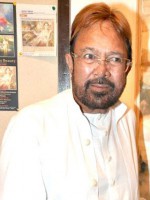Rahul Dev Burman is a Actor, Musical, Producer, Sound and Score Engineer Indian born on 26 june 1939 at Kolkata (Inde)

Rahul Dev Burman (27 June 1939 – 4 January 1994) was an Indian film score composer, who is considered one of the seminal music directors of the Indian film industry. Nicknamed Pancham da, he was the only son of the illustrious composer Sachin Dev Burman.
From the 1960s to the 1990s, RD Burman composed musical scores for 331 movies. He was mainly active in the Hindi film industry as a composer, and also provided vocals for a few of compositions. RD Burman did major work with Asha Bhosle (his wife) and Kishore Kumar, and scored many of the songs that made these singers famous. He served as an influence to the next generation of Indian music directors, and his songs continue to be popular in India even after his death.
RD Burman was born in a Bengali speaking Tripuri family to the Bollywood composer-singer Sachin Dev Burman and his lyricist wife Meera Dev Burman (née Dasgupta), in Calcutta. Initially, he was nicknamed Tublu by his maternal grandmother although he later became known by the nickname of Pancham. According to some stories, he was nicknamed as Pancham because, as a child, whenever he cried, it sounded in the fifth note (Pa) of the Indian musical scale. The word Pancham means five (or fifth) in Bengali, his mother's native language, as well as the language of court of the royal family to which his father belongs. Another theory says that the baby was nicknamed Pancham because he could cry in five different notes. Yet another version is that when the veteran Indian actor Ashok Kumar saw a newborn Rahul uttering the syllable Pa repeatedly, he nicknamed the boy Pancham.
RD Burman received his early education at the St Xavier's School in Kolkata. His father SD Burman was a noted music director in Bollywood, the Mumbai-based Hindi film industry. When he was nine years old, RD Burman composed his first song, Aye meri topi palat ke aa, which his father used in the film Funtoosh (1956). The tune of the song Sar jo tera chakraaye was also composed by him as a child; his father included it in the soundtrack of Guru Dutt's Pyaasa (1957).
In Mumbai, RD Burman was trained by Ustad Ali Akbar Khan (sarod) and Samta Prasad (tabla). He also considered Salil Chowdhury as his guru. He served as an assistant to his father, and often played harmonica in his orchestras. Some of the notable films in which RD Burman is credited as the music assistant include Chalti Ka Naam Gaadi (1958), Kaagaz Ke Phool (1959), Tere Ghar Ke Samne (1963), Bandini (1963), Guide (1965) and Teen Devian (1965). RD Burman also played mouth organ for his father's hit composition Hai Apna Dil to Aawara which was featured in the movie Solva Saal (1958).
In 1959, RD Burman signed up as a music director for the film Raaz, directed by Guru Dutt's assistant Niranjan. However, the film was never completed. The lyrics of this Guru Dutt and Waheeda Rehman-starrer film were written by Shailendra. R D Burman recorded two songs for the film, before it was shelved. The first song was sung by Geeta Dutt and Asha Bhosle, and the second one had vocals by Shamshad Begum.
RD Burman's first released film as an independent music director was Chhote Nawab (1961). When the noted Bollywood comedian Mehmood decided to produce Chhote Nawab, he first approached RD Burman's father Sachin Dev Burman for the music. However, SD Burman turned down the offer, saying that he did not have any free dates. At this meeting, Mehmood noticed Rahul playing tabla, and signed him up as the music director for Chhote Nawab. RD Burman later developed a close association with Mehmood, and did a cameo (apart from composing the music) in Mehmood's Bhoot Bangla (1965).
Initial successes
Burman's first hit movie as a film music director was Teesri Manzil (1966). Burman gave credit to lyricist Majrooh Sultanpuri for recommending him to Nasir Hussain, the producer and writer of the film. Vijay Anand also said that he had arranged a music session for Burman before Nasir Hussain. Teesri Manzil had six songs, all of which were written by Majrooh Sultanpuri, and sung by Mohammed Rafi. Four of these were duets with Asha Bhosle, whom Burman later married. Nasir Hussain went on to sign RD Burman and lyricist Majrooh Sultanpuri for six of his films including Baharon Ke Sapne (1967), Pyar Ka Mausam (1969) and Yaadon Ki Baaraat (1973). Burman's score for Padosan (1968) was well received. Meanwhile, he continued to work as his father's assistant for movies like Jewel Thief (1967) and Prem Pujari (1970).
The superhit Kishore Kumar song Mere Sapnon ki Raani from Aradhana (1969), though credited to his father, is rumoured to have been RD Burman's composition. Kora Kagaz tha Yeh Man Mera from the same film was also his tune. It is believed that when SD Burman fell ill during the recording of the film's music, RD Burman took over and completed the music. He was credited as an associate composer for the film.
Rise to popularity
In the 1970s, RD Burman became highly popular with the Kishore Kumar songs in Rajesh Khanna-starrer movies. Kati Patang (1970), a musical hit, was the beginning of a series of the 1970s films directed by Shakti Samanta of Aradhana fame. Its songs Yeh Shaam Mastani and Yeh Jo Mohabbat Hai, sung by Kishore Kumar, became instant hits. Apart from Kishore Kumar, RD Burman also composed several of the popular songs sung by Mohammed Rafi, Asha Bhosle and Lata Mangeshkar.
In 1970, RD Burman composed the music for Dev Anand's Hare Rama Hare Krishna (1971). The Asha Bhosle song Dum Maro Dum from this film proved to be a seminal rock number in the Hindi film music. The filmmaker Dev Anand did not include the complete version of Dum Maro Dum in the movie, because he was worried that the song would overshadow the film. In the same year, RD Burman composed the music for Amar Prem. The Lata Mangeshkar song Raina Beeti Jaaye from this soundtrack is regarded as a classical music gem in Hindi film music. RD Burman's other hits in 1971 included the romantic song Raat kali ek khwab mein from Buddha Mil Gaya and the Helen-starrer cabaret song Piya Tu Ab To Aaja from Caravan. He received his first Filmfare Award nomination for Caravan.
In 1972, R D Burman composed hit music for several films including Seeta aur Geeta, Rampur ka Lakshman, Mere jeevan saathi, Bombay to Goa, Apna Desh and Parichay. His success continued with hits such as Yaadon Ki Baaraat (1973), Aap ki Kasam (1974), Sholay (1975) and Aandhi (1975). He also composed a song for a small documentary film called Maa Ki Pukaar, in 1975. After his father SD Burman went into coma, R D Burman also completed the music of Mili (1975).
Mohammed Rafi received the National Film Award for Best Male Playback Singer for the song Kya Hua Tera Wada from Hum Kisise Kum Naheen (1977), composed by RD Burman. RD Burman continued to compose several popular songs for films such as Kasme Vaade (1978), Ghar (1978), Gol Maal (1979), Khubsoorat (1980). He received his first Filmfare Best Music Director Award for Sanam Teri Kasam (1981). In 1981, he also composed hit music for Rocky, Satte Pe Satta and Love Story.
The playback singer Kumar Sanu was given his first break by R D Burman in Yeh Desh (1984) as voice of Kamal Haasan. Abhijeet was given his major break by R D Burman in Anand aur Anand (1984). Although he made his debut a long time ago, Hariharan was first noticed in a duet with Kavita Krishnamurthy in Hai Mubarak Aaj ka Din from Boxer (1984), which was composed by R D Burman. In 1985, Mohammed Aziz, made his debut with Shiva Ka Insaaf (1985) under R D Burman.
Decline
During the 1980s, RD Burman was overshadowed by Bappi Lahiri and other disco music composers. Many filmmakers stopped patronizing him, as films featuring his compositions flopped at the box office one after the other. Nasir Hussain, who had signed him up for every single of his productions since Teesri Manzil (1966), did not sign him up for Qayamat Se Qayamat Tak (1988). Hussain defended RD Burman in press, saying that the latter did not give weak music in Zamane Ko Dikhana Hai (1982) and Manzil Manzil (1984). He also said that the composer was going through a lean phase during the recording of Zabardast (1985). But after these three films flopped, Hussain stepped down as a director, and his son and successor Mansoor Khan switched to other composers. The filmmaker Subhash Ghai promised RD Burman Ram Lakhan (1989), but gave it instead to Laxmikant-Pyarelal, who had earlier played in Burman's orchestra.
In the year 1986, RD Burman composed the songs of Ijaazat: this score is regarded as one of his best scores. However, the film belong to the Parallel Cinema (art film) category, so it did not stop the decline of RD Burman's commercial film career. All the four songs in Ijaazat were sung by Asha Bhosle and written by Gulzar. RD Burman was greatly appreciated by the critics for setting the non-rhyming lyrics of the song Mera Kuchh Saamaan to the music. While both Asha Bhosle (Best Female Playback) and Gulzar (Best Lyrics) received National Awards for the score, RD Burman received none.
RD Burman suffered from a heart attack in 1988, and in 1989, Burman underwent a heart bypass surgery at Princess Grace Hospital in London. During this period, he composed many tunes, which were never released. He composed music for Vidhu Vinod Chopra's movie Parinda in 1989. He composed one song called Chhod Ke Na Jaana which was sung by Asha Bhosle for the movie Gang. But since the movie took too long to release and due to his untimely death, director Mazhar Khan signed in the then little known Anu Malik for the music of the movie. Thenmavin Kombath, a Malayalam film by Priyadarshan was the last film he signed, but he died before he could score for the film. The music of 1942: A Love Story (1994) was released after his death, and was highly successful. It posthumously won him the third and last of his Filmfare Awards.
Source : Wikidata
Rahul Dev Burman

Nationality Inde
Birth 26 june 1939 at Kolkata (Inde)
Death 3 january 1994 (at 54 years)
Awards Filmfare Awards
Birth 26 june 1939 at Kolkata (Inde)
Death 3 january 1994 (at 54 years)
Awards Filmfare Awards
Rahul Dev Burman (27 June 1939 – 4 January 1994) was an Indian film score composer, who is considered one of the seminal music directors of the Indian film industry. Nicknamed Pancham da, he was the only son of the illustrious composer Sachin Dev Burman.
From the 1960s to the 1990s, RD Burman composed musical scores for 331 movies. He was mainly active in the Hindi film industry as a composer, and also provided vocals for a few of compositions. RD Burman did major work with Asha Bhosle (his wife) and Kishore Kumar, and scored many of the songs that made these singers famous. He served as an influence to the next generation of Indian music directors, and his songs continue to be popular in India even after his death.
Biography
Early lifeRD Burman was born in a Bengali speaking Tripuri family to the Bollywood composer-singer Sachin Dev Burman and his lyricist wife Meera Dev Burman (née Dasgupta), in Calcutta. Initially, he was nicknamed Tublu by his maternal grandmother although he later became known by the nickname of Pancham. According to some stories, he was nicknamed as Pancham because, as a child, whenever he cried, it sounded in the fifth note (Pa) of the Indian musical scale. The word Pancham means five (or fifth) in Bengali, his mother's native language, as well as the language of court of the royal family to which his father belongs. Another theory says that the baby was nicknamed Pancham because he could cry in five different notes. Yet another version is that when the veteran Indian actor Ashok Kumar saw a newborn Rahul uttering the syllable Pa repeatedly, he nicknamed the boy Pancham.
RD Burman received his early education at the St Xavier's School in Kolkata. His father SD Burman was a noted music director in Bollywood, the Mumbai-based Hindi film industry. When he was nine years old, RD Burman composed his first song, Aye meri topi palat ke aa, which his father used in the film Funtoosh (1956). The tune of the song Sar jo tera chakraaye was also composed by him as a child; his father included it in the soundtrack of Guru Dutt's Pyaasa (1957).
In Mumbai, RD Burman was trained by Ustad Ali Akbar Khan (sarod) and Samta Prasad (tabla). He also considered Salil Chowdhury as his guru. He served as an assistant to his father, and often played harmonica in his orchestras. Some of the notable films in which RD Burman is credited as the music assistant include Chalti Ka Naam Gaadi (1958), Kaagaz Ke Phool (1959), Tere Ghar Ke Samne (1963), Bandini (1963), Guide (1965) and Teen Devian (1965). RD Burman also played mouth organ for his father's hit composition Hai Apna Dil to Aawara which was featured in the movie Solva Saal (1958).
In 1959, RD Burman signed up as a music director for the film Raaz, directed by Guru Dutt's assistant Niranjan. However, the film was never completed. The lyrics of this Guru Dutt and Waheeda Rehman-starrer film were written by Shailendra. R D Burman recorded two songs for the film, before it was shelved. The first song was sung by Geeta Dutt and Asha Bhosle, and the second one had vocals by Shamshad Begum.
RD Burman's first released film as an independent music director was Chhote Nawab (1961). When the noted Bollywood comedian Mehmood decided to produce Chhote Nawab, he first approached RD Burman's father Sachin Dev Burman for the music. However, SD Burman turned down the offer, saying that he did not have any free dates. At this meeting, Mehmood noticed Rahul playing tabla, and signed him up as the music director for Chhote Nawab. RD Burman later developed a close association with Mehmood, and did a cameo (apart from composing the music) in Mehmood's Bhoot Bangla (1965).
Initial successes
Burman's first hit movie as a film music director was Teesri Manzil (1966). Burman gave credit to lyricist Majrooh Sultanpuri for recommending him to Nasir Hussain, the producer and writer of the film. Vijay Anand also said that he had arranged a music session for Burman before Nasir Hussain. Teesri Manzil had six songs, all of which were written by Majrooh Sultanpuri, and sung by Mohammed Rafi. Four of these were duets with Asha Bhosle, whom Burman later married. Nasir Hussain went on to sign RD Burman and lyricist Majrooh Sultanpuri for six of his films including Baharon Ke Sapne (1967), Pyar Ka Mausam (1969) and Yaadon Ki Baaraat (1973). Burman's score for Padosan (1968) was well received. Meanwhile, he continued to work as his father's assistant for movies like Jewel Thief (1967) and Prem Pujari (1970).
The superhit Kishore Kumar song Mere Sapnon ki Raani from Aradhana (1969), though credited to his father, is rumoured to have been RD Burman's composition. Kora Kagaz tha Yeh Man Mera from the same film was also his tune. It is believed that when SD Burman fell ill during the recording of the film's music, RD Burman took over and completed the music. He was credited as an associate composer for the film.
Rise to popularity
In the 1970s, RD Burman became highly popular with the Kishore Kumar songs in Rajesh Khanna-starrer movies. Kati Patang (1970), a musical hit, was the beginning of a series of the 1970s films directed by Shakti Samanta of Aradhana fame. Its songs Yeh Shaam Mastani and Yeh Jo Mohabbat Hai, sung by Kishore Kumar, became instant hits. Apart from Kishore Kumar, RD Burman also composed several of the popular songs sung by Mohammed Rafi, Asha Bhosle and Lata Mangeshkar.
In 1970, RD Burman composed the music for Dev Anand's Hare Rama Hare Krishna (1971). The Asha Bhosle song Dum Maro Dum from this film proved to be a seminal rock number in the Hindi film music. The filmmaker Dev Anand did not include the complete version of Dum Maro Dum in the movie, because he was worried that the song would overshadow the film. In the same year, RD Burman composed the music for Amar Prem. The Lata Mangeshkar song Raina Beeti Jaaye from this soundtrack is regarded as a classical music gem in Hindi film music. RD Burman's other hits in 1971 included the romantic song Raat kali ek khwab mein from Buddha Mil Gaya and the Helen-starrer cabaret song Piya Tu Ab To Aaja from Caravan. He received his first Filmfare Award nomination for Caravan.
In 1972, R D Burman composed hit music for several films including Seeta aur Geeta, Rampur ka Lakshman, Mere jeevan saathi, Bombay to Goa, Apna Desh and Parichay. His success continued with hits such as Yaadon Ki Baaraat (1973), Aap ki Kasam (1974), Sholay (1975) and Aandhi (1975). He also composed a song for a small documentary film called Maa Ki Pukaar, in 1975. After his father SD Burman went into coma, R D Burman also completed the music of Mili (1975).
Mohammed Rafi received the National Film Award for Best Male Playback Singer for the song Kya Hua Tera Wada from Hum Kisise Kum Naheen (1977), composed by RD Burman. RD Burman continued to compose several popular songs for films such as Kasme Vaade (1978), Ghar (1978), Gol Maal (1979), Khubsoorat (1980). He received his first Filmfare Best Music Director Award for Sanam Teri Kasam (1981). In 1981, he also composed hit music for Rocky, Satte Pe Satta and Love Story.
The playback singer Kumar Sanu was given his first break by R D Burman in Yeh Desh (1984) as voice of Kamal Haasan. Abhijeet was given his major break by R D Burman in Anand aur Anand (1984). Although he made his debut a long time ago, Hariharan was first noticed in a duet with Kavita Krishnamurthy in Hai Mubarak Aaj ka Din from Boxer (1984), which was composed by R D Burman. In 1985, Mohammed Aziz, made his debut with Shiva Ka Insaaf (1985) under R D Burman.
Decline
During the 1980s, RD Burman was overshadowed by Bappi Lahiri and other disco music composers. Many filmmakers stopped patronizing him, as films featuring his compositions flopped at the box office one after the other. Nasir Hussain, who had signed him up for every single of his productions since Teesri Manzil (1966), did not sign him up for Qayamat Se Qayamat Tak (1988). Hussain defended RD Burman in press, saying that the latter did not give weak music in Zamane Ko Dikhana Hai (1982) and Manzil Manzil (1984). He also said that the composer was going through a lean phase during the recording of Zabardast (1985). But after these three films flopped, Hussain stepped down as a director, and his son and successor Mansoor Khan switched to other composers. The filmmaker Subhash Ghai promised RD Burman Ram Lakhan (1989), but gave it instead to Laxmikant-Pyarelal, who had earlier played in Burman's orchestra.
In the year 1986, RD Burman composed the songs of Ijaazat: this score is regarded as one of his best scores. However, the film belong to the Parallel Cinema (art film) category, so it did not stop the decline of RD Burman's commercial film career. All the four songs in Ijaazat were sung by Asha Bhosle and written by Gulzar. RD Burman was greatly appreciated by the critics for setting the non-rhyming lyrics of the song Mera Kuchh Saamaan to the music. While both Asha Bhosle (Best Female Playback) and Gulzar (Best Lyrics) received National Awards for the score, RD Burman received none.
RD Burman suffered from a heart attack in 1988, and in 1989, Burman underwent a heart bypass surgery at Princess Grace Hospital in London. During this period, he composed many tunes, which were never released. He composed music for Vidhu Vinod Chopra's movie Parinda in 1989. He composed one song called Chhod Ke Na Jaana which was sung by Asha Bhosle for the movie Gang. But since the movie took too long to release and due to his untimely death, director Mazhar Khan signed in the then little known Anu Malik for the music of the movie. Thenmavin Kombath, a Malayalam film by Priyadarshan was the last film he signed, but he died before he could score for the film. The music of 1942: A Love Story (1994) was released after his death, and was highly successful. It posthumously won him the third and last of his Filmfare Awards.
Usually with
Filmography of Rahul Dev Burman (252 films)
Actor
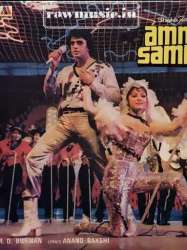
Aamne Samne (1982)
, 2h15Genres Drama, Action, Musical, Crime
Actors Mithun Chakraborty, Leela Mishra, Bindiya Goswami, Kamal Kapoor, Manoj Kumar, Dinesh Thakur
Rating63%





Gopi (Mithun Chakraborty) is a simple minded villager who travels to Mumbai looking for a job. He is approached by some men who mistaken him for Johnny (also Mithun Chakraborty). Johnny is a criminal who works for the underworld don Supremo (Kamal Kapoor) and is also a stage performer by day to cover up his criminal activities. When he meets his lookalike, Johnny decides to use him as a fall guy in case the police discover who he is. Gopi is trained into becoming Johnny to convincingly impersonate him unknowingly becoming an accomplice to Johnny's crimes. When the police discover Johnny has stolen valuable statues, Gopi is blamed and must prove his innocence.

Pyar Ka Mausam (1969)
Directed by Nazir Hussain, Nasir Husain
Genres Drama, Musical, Romance
Actors Shashi Kapoor, Asha Parekh, Bharat Bhushan, Nirupa Roy, Madan Puri, Iftekhar
Rating60%





Seema is the only child of widowed Mohan, who is adopted by Mohan's boss, Sardar Ranjit Singh, who has no heir to his estate, as his daughter, Jamuna, eloped with a poor peasant, Gopal. Ranjit does not get along with his step-brother, Shankar. Jamuna manages to placate her dad, & he goes to her house, only to find it in flames with Gopal burned to death, and their son, Sunder, missing. Years later, Seema has now grown up and meets with a young man named Pyarelal in Ooty. She meets him a year later, but this time he introduces himself as Jhatpat Singh, a man she was supposedly engaged to in their childhood. Shortly thereafter she meets with the real Jhatpat Singh, and changes her mind about the fake Jhatpat Singh alias Pyarelal. Now Sunil knows that he was adopted and understands that he was the lost son of Gopal. He goes to Sardar Ranjit Singh and appoints to be an estate manager. There he meets Seema again and they rekindle their romance. By that time, planning to steal away property, Shankar sends his son as the lost son of Jamuna and Gopal. Ranjit Singh believes him and wants to marry seema to Shankar's son. After some misunderstandings, family finally reunites and Jamuna's sanity returns. Movie ends with the marriage of Seema and Sunil/Sunder.
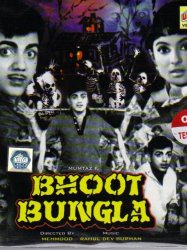
Bhoot Bungla (1965)
Directed by Mehmood Ali
Genres Drama, Comedy, Horror
Actors Mehmood Ali, Tanuja, Nazir Hussain, Nasir Husain, Nana Palsikar, Asit Sen
Roles (as Pancham)
Rating63%





Fifty years ago, Kundanlal was murdered and his wife and child vanished on a dark night, at the haunted bungalow surrounded by a jungle in the outskirts of Bombay.
Scriptwriter

Aamne Samne (1982)
, 2h15Genres Drama, Action, Musical, Crime
Actors Mithun Chakraborty, Leela Mishra, Bindiya Goswami, Kamal Kapoor, Manoj Kumar, Dinesh Thakur
Roles Musical
Rating63%





Gopi (Mithun Chakraborty) is a simple minded villager who travels to Mumbai looking for a job. He is approached by some men who mistaken him for Johnny (also Mithun Chakraborty). Johnny is a criminal who works for the underworld don Supremo (Kamal Kapoor) and is also a stage performer by day to cover up his criminal activities. When he meets his lookalike, Johnny decides to use him as a fall guy in case the police discover who he is. Gopi is trained into becoming Johnny to convincingly impersonate him unknowingly becoming an accomplice to Johnny's crimes. When the police discover Johnny has stolen valuable statues, Gopi is blamed and must prove his innocence.

Sanjog (1972)
Genres Drama, Comedy
Actors Amitabh Bachchan, Mala Sinha, Aruna Irani, Madan Puri, Nasir Husain, Johnny Walker
Roles Musical
Rating58%





Producer

Jawani Diwani (1972)
Directed by Narender Bedi
Genres Drama, Musical, Romance
Actors Randhir Kapoor, Jaya Bachchan, Balraj Sahni, Nirupa Roy, Iftekhar, A. K. Hangal
Roles Producer
Rating62%





Madhu (Nirupa Roy) falls in love with Ravi Anand (Balraj Sahni), son of an employee in her Thakur brother's (Iftekhar) household. When they get married, the Thakur breaks all ties with them, she moves into Ravi's home, where they live with his younger brother, Vijay (Randhir Kapoor). Subsequently, Vijay meets a girl, Neeta (Jaya Bhaduri), at school, with the usual problems with parents. She turns out to be the Thakur's daughter, who has been promised in marriage to Benny Sinha (Narendra Nath).
Sound

Dil Vil Pyaar Vyaar (2014)
Directed by Tigmanshu Dhulia, Anant Mahadevan, Vivek Vaswani
Genres Romance
Actors Sanjay Suri, Jimmy Shergill, Neeru Bajwa, R. Madhavan, Asrani, Raqesh Vashisth
Rating54%





The first love story is about love getting a second chance. Dev (Sanjay Suri) is a widower, his wife Payal (Dipannita Sharma) dies soon after their honeymoon. He moves to Mumbai from Pune with his sister Rachna (Bhavna Pani). Here he meets Gauri (Sonali Kulkarni), who lives with her psychosomatically ill brother Gaurav (Rakesh Bapat).

Bachna Ae Haseeno (2008)
, 2h28Directed by Siddharth Anand
Origin Inde
Genres Drama, Comedy, Romantic comedy, Romance
Themes Films about music and musicians, Musical films, Bollywood
Actors Ranbir Kapoor, Deepika Padukone, Bipasha Basu, Minissha Lamba, Kunal Kapoor, Bhanu Sri Mehra
Roles Music
Rating61%





The film narrates the journey of a young man named Raj Sharma (Ranbir Kapoor), who meets three young women at different stages in his life: Mahi (Minissha Lamba), a small-town girl from Punjab; Radhika (Bipasha Basu), an aspiring model in Mumbai; and Gayatri (Deepika Padukone), a non-resident Indian student in Australia. It is the story of a ladies' man who runs from one conquest to another only to crash into true love.
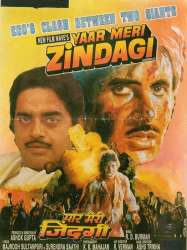
Yaar Meri Zindagi (2008)
Actors Amitabh Bachchan, Shatrughan Sinha, Sharada, Sudha Chandran, Iftekhar
Rating49%





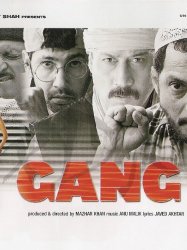
Gang (2000)
Directed by Mazhar Khan
Genres Drama, Action, Crime
Actors Jackie Shroff, Nana Patekar, Kumar Gaurav, Javed Jaffrey, Juhi Chawla, Shagufta Ali
Roles Music
Rating62%





Four friends, Gangu (Jackie Shroff), Abdul (Nana Patekar), Nihal (Kumar Gaurav) and Gary (Jaaved Jaffrey)- which forms the word G.A.N.G, get together to start their business, but their roots are built on friendship and trust. They succeed in their criminal goals, although Gangu is arrested and sentenced to jail for five years. Before going to jail, he asks them to promise to go straight, to which they all agree.
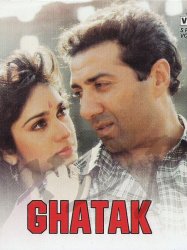
Ghatak: Lethal (1996)
, 2h38Directed by Rajkumar Santoshi
Genres Drama, Action
Actors Sunny Deol, Meenakshi Seshadri, Danny Denzongpa, Amrish Puri, K. K. Raina, Sanjay Batra
Roles Music
Rating74%





Kashi (Sunny Deol) is a kind-hearted wrestler and the dutiful son of Shambhu Nath (Amrish Puri) living in Banaras. Shambhu Nath who was a freedom fighter awarded with Tambra Patra, is an honourable and respectable man in town. Kashi comes to Mumbai with his father for his medical treatment of throat and stays with his brother Shiv Nath (K. K. Raina). Kashi meets Gauri (Meenakshi Seshadri) and starts liking her. He learns that the colony is being terrorized by a tyrannical gangster named Katya (Danny Denzongpa) along with his other six brothers. Before Kashi's arrival, a resident named Sachdev (Om Puri) tries to initiate revolt against Katya but gets ruthlessly killed by him, thereby making Malti (Ila Arun), wife of Sachdev, go mad. Katya and his brothers become enemy with Kashi when he beats up their goons when they were beating up Malti. Shambhu Nath is later diagnosed with throat cancer and has only a few days to live.
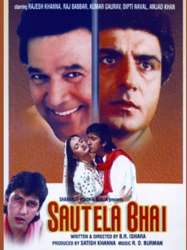
Sautela Bhai (1996)
Directed by B. R. Ishara
Actors Rajesh Khanna, Raj Babbar, Kumar Gaurav, Farah Naaz, Moon Moon Sen, Deepti Naval
Rating63%





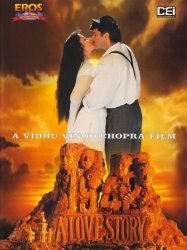
1942: A Love Story (1994)
, 2h37Directed by Vidhu Vinod Chopra
Origin Inde
Genres Drama, Musical theatre, Action, Musical, Romance
Themes Films about music and musicians, Musical films, Bollywood
Actors Anil Kapoor, Jackie Shroff, Manisha Koirala, Anupam Kher, Pramod Moutho, Chandni
Roles Original Music Composer
Rating71%





The film is set in 1942, when the British Raj was declining. It was a time when many Indians were either working for the British or rallying in underground meetings and protests against them. In this atmosphere, Naren Singh (Anil Kapoor) falls in love with Rajeshwari "Rajjo" Pathak (Manisha Koirala). Their romance is shown developing in spite of the political and social unrest at the time.

Janam Se Pehle (1994)
Directed by B. R. Ishara
Actors Raj Babbar, Farah Naaz, Sumeet Saigal, Shafi Ali Inamdar, Sadashiv Amarapurkar, Viju Khote
Rating46%





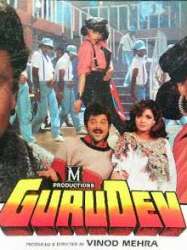
Gurudev (1993)
, 3hDirected by Vinod Mehra, Raj N. Sippy
Genres Drama, Action, Romance
Actors Rishi Kapoor, Anil Kapoor, Sridevi, Kader Khan, Seema Deo, Kiran Kumar
Roles Playback Singer
Rating45%





Inspector Dev Kumar and Gaurav alias Guru are childhood friends. The problem is that while Dev Kumar is with the police, his dad, Parshu Ram, works with the underworld, and is the right-hand man of Kakhan, a criminal don, who is also Guru's dad. When Inspector Khan is assigned the case of apprehending Kakhan, his first suspect is none other than Dev himself, and Dev must prove to Khan that he is earnest, and will not hesitate to arrest Kakhan. It remains to be seen if Dev will really apprehend his friend's dad, or just play around without really getting anywhere.
 Connection
Connection



